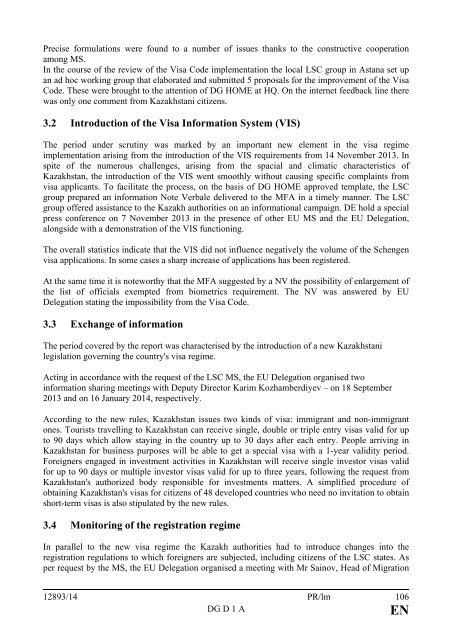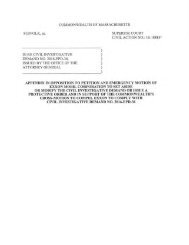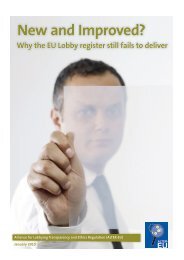eu-com-schengen-coop
eu-com-schengen-coop
eu-com-schengen-coop
You also want an ePaper? Increase the reach of your titles
YUMPU automatically turns print PDFs into web optimized ePapers that Google loves.
Precise formulations were found to a number of issues thanks to the constructive <strong>coop</strong>eration<br />
among MS.<br />
In the course of the review of the Visa Code implementation the local LSC group in Astana set up<br />
an ad hoc working group that elaborated and submitted 5 proposals for the improvement of the Visa<br />
Code. These were brought to the attention of DG HOME at HQ. On the internet feedback line there<br />
was only one <strong>com</strong>ment from Kazakhstani citizens.<br />
3.2 Introduction of the Visa Information System (VIS)<br />
The period under scrutiny was marked by an important new element in the visa regime<br />
implementation arising from the introduction of the VIS requirements from 14 November 2013. In<br />
spite of the numerous challenges, arising from the spacial and climatic characteristics of<br />
Kazakhstan, the introduction of the VIS went smoothly without causing specific <strong>com</strong>plaints from<br />
visa applicants. To facilitate the process, on the basis of DG HOME approved template, the LSC<br />
group prepared an information Note Verbale delivered to the MFA in a timely manner. The LSC<br />
group offered assistance to the Kazakh authorities on an informational campaign. DE hold a special<br />
press conference on 7 November 2013 in the presence of other EU MS and the EU Delegation,<br />
alongside with a demonstration of the VIS functioning.<br />
The overall statistics indicate that the VIS did not influence negatively the volume of the Schengen<br />
visa applications. In some cases a sharp increase of applications has been registered.<br />
At the same time it is noteworthy that the MFA suggested by a NV the possibility of enlargement of<br />
the list of officials exempted from biometrics requirement. The NV was answered by EU<br />
Delegation stating the impossibility from the Visa Code.<br />
3.3 Exchange of information<br />
The period covered by the report was characterised by the introduction of a new Kazakhstani<br />
legislation governing the country's visa regime.<br />
Acting in accordance with the request of the LSC MS, the EU Delegation organised two<br />
information sharing meetings with Deputy Director Karim Kozhamberdiyev – on 18 September<br />
2013 and on 16 January 2014, respectively.<br />
According to the new rules, Kazakhstan issues two kinds of visa: immigrant and non-immigrant<br />
ones. Tourists travelling to Kazakhstan can receive single, double or triple entry visas valid for up<br />
to 90 days which allow staying in the country up to 30 days after each entry. People arriving in<br />
Kazakhstan for business purposes will be able to get a special visa with a 1-year validity period.<br />
Foreigners engaged in investment activities in Kazakhstan will receive single investor visas valid<br />
for up to 90 days or multiple investor visas valid for up to three years, following the request from<br />
Kazakhstan's authorized body responsible for investments matters. A simplified procedure of<br />
obtaining Kazakhstan's visas for citizens of 48 developed countries who need no invitation to obtain<br />
short-term visas is also stipulated by the new rules.<br />
3.4 Monitoring of the registration regime<br />
In parallel to the new visa regime the Kazakh authorities had to introduce changes into the<br />
registration regulations to which foreigners are subjected, including citizens of the LSC states. As<br />
per request by the MS, the EU Delegation organised a meeting with Mr Sainov, Head of Migration<br />
12893/14 PR/lm 106<br />
DG D 1 A<br />
EN












